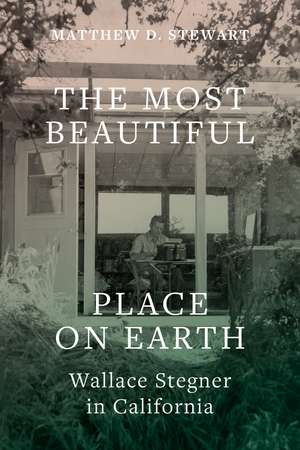The Most Beautiful Place on Earth: Wallace Stegner in California
Autor Matthew D. Stewarten Limba Engleză Paperback – 19 mai 2022
This book tells the story of Stegner and his family as they made a home just outside of Palo Alto, California, during its transition from the Valley of Heart’s Delight (known for its rolling hills and orchards) to Silicon Valley. In this thoughtful study of the novels Stegner wrote in California—including his Pulitzer Prize–winning Angle of Repose—readers are invited to consider with Stegner what the practice of place requires in the American West. Specialists in the literature and history of the American West will find new analyses of Stegner and his influential work. Other readers will be guided through Stegner’s work in concrete and accessible prose, and anyone who has longed for home and a sense of place will encounter a powerful, beautiful, and at times tragic attempt to build and preserve it.
Preț: 288.20 lei
Nou
Puncte Express: 432
Preț estimativ în valută:
55.15€ • 58.01$ • 46.08£
55.15€ • 58.01$ • 46.08£
Carte indisponibilă temporar
Doresc să fiu notificat când acest titlu va fi disponibil:
Se trimite...
Preluare comenzi: 021 569.72.76
Specificații
ISBN-13: 9781647690564
ISBN-10: 1647690560
Pagini: 192
Ilustrații: 8 illustrations
Dimensiuni: 152 x 152 x 10 mm
Greutate: 0.34 kg
Editura: University of Utah Press
Colecția University of Utah Press
ISBN-10: 1647690560
Pagini: 192
Ilustrații: 8 illustrations
Dimensiuni: 152 x 152 x 10 mm
Greutate: 0.34 kg
Editura: University of Utah Press
Colecția University of Utah Press
Recenzii
“Part field guide to Wallace Stegner's California novels, part hymn to Stegner's ideas of community and place, Matthew Stewart's graceful book asks what role the 20th-century California suburbs played in the author's famed geography of hope.”
—Tara Penry, past president, Western Literature Association
“Provocative, extraordinarily well researched, and especially thoughtful. Matthew Stewart’s study is a work of intellectual history, or if one wishes, a history of ideas. Through close, revealing readings of Stegner’s novels and stories about California, Stewart provides a path-breaking examination of Stegner’s thoughts, especially as they are related to such ideas as community, home, place, character, and sociocultural change.”
—Richard W. Etulain, University of New Mexico
“Matthew Stewart is a historian who takes Stegner’s fiction seriously as a guide to his thought about historical and social questions. His book offers an important and valuable reexamination of this multifaceted figure in the West.”
—William Handley, University of Southern California
"An imagination like [Stegner's], fictions like his—born from affection—may not provide us with data or answers but may help us feel 'somehow more substantial and less troubled, characters more permanent.' And they may show us how we can help the land we find underfoot become a beloved, well-cared-for place. Stewart’s book goes a long way towards helping us see the world, and its people, the way Stegner hoped we could."
—Seth Wieck, Front Porch Republic
—Tara Penry, past president, Western Literature Association
“Provocative, extraordinarily well researched, and especially thoughtful. Matthew Stewart’s study is a work of intellectual history, or if one wishes, a history of ideas. Through close, revealing readings of Stegner’s novels and stories about California, Stewart provides a path-breaking examination of Stegner’s thoughts, especially as they are related to such ideas as community, home, place, character, and sociocultural change.”
—Richard W. Etulain, University of New Mexico
“Matthew Stewart is a historian who takes Stegner’s fiction seriously as a guide to his thought about historical and social questions. His book offers an important and valuable reexamination of this multifaceted figure in the West.”
—William Handley, University of Southern California
"An imagination like [Stegner's], fictions like his—born from affection—may not provide us with data or answers but may help us feel 'somehow more substantial and less troubled, characters more permanent.' And they may show us how we can help the land we find underfoot become a beloved, well-cared-for place. Stewart’s book goes a long way towards helping us see the world, and its people, the way Stegner hoped we could."
—Seth Wieck, Front Porch Republic
Notă biografică
Matthew D. Stewart teaches humanities at The Ambrose School in Meridian, Idaho, and is associate editor at Front Porch Republic. He holds a PhD in history from Syracuse University.
Cuprins
Acknowledgments
Introduction: Wallace Stegner in the Most Beautiful Place on Earth
1. To Los Altos Hills
2. Village Democracy
3. Community, and Its Consequences
4. The Amputated Present
5. Growing Old in the New West
Conclusion: The Geography of Hope
Appendix
Notes
Bibliography
Index
